Assassin’s Creed Valhalla Review — IGN
Like Assassin’s Creed Odyssey and Origins before it, Assassin’s Creed Valhalla continues the series trajectory into a full-fledged open-world RPG. Though Ubisoft has dug up some of its stealth-action roots to make that style more appealing, Valhalla’s focus is on the absolutely massive recreation of Dark Ages England, brought to life with stunning beauty and a level of detail I’ve rarely seen. It’s been an impressive showcase for the Xbox Series X (and presumably the PlayStation 5, but Ubisoft only gave us access to the Xbox version ahead of launch), playing in 4K and a near-constant 60 frames per second. You have to put up with some new progression system ideas that don’t quite deliver, and an abundance of bugs, but there’s a staggering number of things to do, explore, and discover in and around Valhalla’s more atmospheric storytelling.
Assassin’s Creed Valhalla’s story follows Eivor, a male or female Norse Viking who grows up with a chip on their shoulder and vengeance in their heart after some particularly dastardly events in the opening cinematic. From those starting moments, the table is set and soon you and your brother Sigurd are off on a grand adventure to England, a land ripe with wealth and glory, and already well-integrated with Danes and Norse from years of Viking invasion and conquest. That sets the stage for your arrival in England as you settle the land and forge alliances to protect and expand your fledgling homestead against the chaos and political dust storm of warring factions across England’s four kingdoms: Mercia, East Anglia, Northumbria, and Wessex.LoadingThe last time Assassin’s Creed tried letting us choose to play as a male or female protagonist the results were hit or miss, especially on the male side. Here, however, the performances of both the male and female versions of Eivor are admirable, though some accents drift a bit. (At one point I could’ve sworn female Eivor made a stop in Boston from the way she crushed the word “harbor,” but quickly enough it was back to Norse normal.) These brief moments are absolutely the exception to the otherwise steady and earnest delivery throughout, which is also true of most of the main characters.
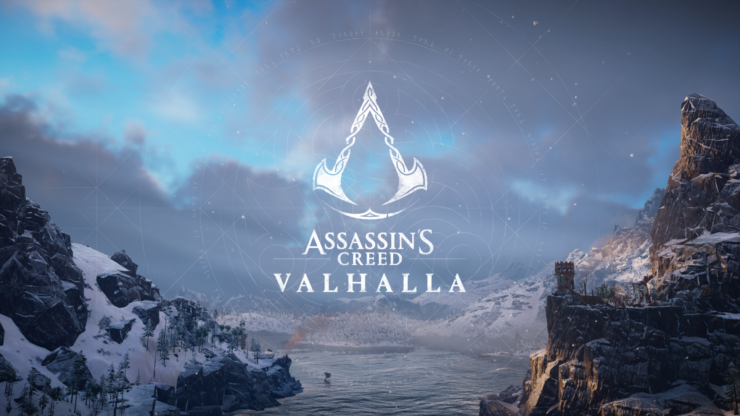 Outside the main cast, though some random NPCs can be a little… much. But special mention goes out to Sigurd, who channels fiery intensity and flirts with crazy in his performances, and that performance is accentuated by fascinating facial expressions that often lean uncomfortably close to the latter.
Outside the main cast, though some random NPCs can be a little… much. But special mention goes out to Sigurd, who channels fiery intensity and flirts with crazy in his performances, and that performance is accentuated by fascinating facial expressions that often lean uncomfortably close to the latter.
The siblings’ quest for wealth, glory, and power throughout England is darker, sadder, and more grounded than the tones of the past few games had led me to expect.
“
Even so, the siblings’ quest for wealth, glory, and power throughout England is darker, sadder, and more grounded than the tones of the past few games had led me to expect. There are moments throughout where the griefstriken, bittersweet, and just plain bitter resolutions reminded me of The Witcher 3’s Bloody Baron delivery. This is a dirty, dingy world where life is cheap and nearly everyone is scratching and clawing to gain power – or to keep it – regardless of who gets burned along the way.
One particular instance found me helping the leader of a nearby shire – regions within the four kingdoms (no hobbits) – who had discovered a traitor in her inner circle and charged me with rooting them out because she loved each one of them as family and couldn’t trust herself to see past their lies. The resulting few hours of investigation brought me to the end of the road, and I made the best decision based on the available information I had. To be honest, I’m not sure I was right; I still don’t know. If the person I accused was guilty, Valhalla never gave me more clarity, and the uncertainty seems very intentional. My judgment was accepted and the consequences were swiftly doled out, and that was that. I’ve found myself thinking about that decision ever since. But that’s the business of eighth-century England, I suppose.Loading
A World Separated by an Ocean
Valhalla’s vast interpretation of The Dark Ages of Britain is massive, and when coupled with a significant portion of Norway, Assassin’s Creed Valhalla presents a staggeringly large playground through which you ply your trade. And no matter where you are, it’s absolutely stunning.
And no matter where you are, it’s absolutely stunning.
As I played it on the Xbox Series X, running 4K resolution and 60 frames per second, it may be the most beautiful Assassin’s Creed world yet; certainly the most satisfying to sit back and watch. The snow-blanketed tundras and mountainous ranges of Norway are breathtaking, especially at night as the aurora illuminates the sky above. The rolling green hills of England, cut up by iconic stone walls, are a ready canvas for the rays of light that pierce through the muggy cloud cover, casting shadows that slowly roll across the landscape. It’s hard to overstate how gorgeous a scene can be when the various lighting and weather effects systems are all working in unison. When I stormed the banks of a small riverside church, ready to pillage and plunder, the streaks of light bombarding the dense fog lit up the screen and enveloped the Christian cross in a scene that could’ve been pulled from a Dennis Villeneuve film, only with more heavy-handedness.
Every IGN Assassin’s Creed Review
Beyond the beauty and thick atmosphere of the locales themselves, Assassin’s Creed Valhalla’s England is in turmoil. It’s home to clashes between Danes, Norse, Saxons, Britons, Picts, and more, all of whom have stuck a claim in one hunk of rock or another and will kill you to defend it – or to take it, depending on which side of the fence you happen to land on. It’s a confusing mess of integration that creates an excellent social and political knot into which to tie this story, compounded by cultural and religious elements that really drive a sense of otherness in the many different regions, even if they’re just down the river.
But as all Assassin’s Creed games do, the undercurrent of Assassins versus the Order of the Ancients runs everywhere. It’s well represented in the various factions, and even in the decaying bones of the Roman Empire whose structures and architecture not only litter every region, but serve as excellent places to delve into the necessary long-forgotten tombs, crypts, and subterranean structures the series needs to hide its ancient order secrets. Again, that’s similar to Assassin’s Creed Odyssey, but much of the legwork of hunting down The Order is optional outside the main antagonists that inject themselves into your tale and force that storyline.
Again, that’s similar to Assassin’s Creed Odyssey, but much of the legwork of hunting down The Order is optional outside the main antagonists that inject themselves into your tale and force that storyline.
Beyond the beauty and thick atmosphere of the locales themselves, Assassin’s Creed Valhalla’s England is in turmoil.
“
In fact, the Assassin’s Brotherhood elements that rope Eivor in start softly, slowly weaving in and out of their story with admirable restraint before the usual Dan-Brown-ification picks up and reveals everything is touched by these organizations in one form or another. But the focus rarely shifts completely from the Eivor’s more-engaging efforts to build a network of alliances throughout England’s four kingdoms and its many, many shires.
One final note before we move on, without spoiling anything: as a huge fan of mythology, I’m stupidly excited for everyone to see Ubisoft’s interpretation of the Norse pantheon and Asgard. Tackling something so mystical and otherworldly had to be tough, but the end result is a more “realistic” and granular take on it than you’d be used to if your familiarity revolves around the Marvel Cinematic Universe or comic books. That’s not a slight on either, just an acknowledgement that this is a refreshing change of pace, especially considering how insane Norse mythology is when you get into the weeds.Loading
Tackling something so mystical and otherworldly had to be tough, but the end result is a more “realistic” and granular take on it than you’d be used to if your familiarity revolves around the Marvel Cinematic Universe or comic books. That’s not a slight on either, just an acknowledgement that this is a refreshing change of pace, especially considering how insane Norse mythology is when you get into the weeds.Loading
To Go A Viking
Many of Valhalla’s consistent high points come as you live the life of a stereotypical Viking. Aboard your customizable longship, you’ll sail along snaking rivers and lead your clan in raids against the gold-swollen churches and monasteries of England, bloated with supplies and materials needed to build your new settlement that then acts as your homebase and quest hub. The pageantry of raiding is powerful: as you charge in, thatch-roof huts erupt in flames while priests and villagers wail and scurry throughout the fray. Even after so many hours, I’ve yet to grow tired of blowing the horn as we approach the shore, and running up the hill as imposing stone steeples adorned in crosses and decoration tower over. It’s a welcome distraction from longer and more involved quest chains, and provides a quick hit of combat serotonin when you just need to bury your axe in something.
It’s a welcome distraction from longer and more involved quest chains, and provides a quick hit of combat serotonin when you just need to bury your axe in something.
The pageantry of raiding is powerful: as you charge in, thatch-roof huts erupt in flames while priests and villagers wail and scurry throughout the fray.
“
Like many wars of that time, eventually you’re going to have to siege a castle or fortress, and that’s where Valhalla really cranks up the medievalness. These mass assaults often serve as the payoffs for longer quest chains, pitting your armies against whatever upstart king, jarl, or noble calls themselves lord of the lands you aim to conquer. These battles are fever-pitched and chaotic, and while they’re often impressive to look at they usually require a small checklist of orderly tasks to complete: ram the gates to smithereens, breach the inner keep, and kill the despot at the center. After a few of these you can start to pick up the patterns, but often they involve scouting defenses and softening up the opposition before going in, so that adds an element of strategy to it even if it eventually boils down to you taking on the big bad guy at the end. Still, breaking through fortifications with siege weaponry and working toward the inner keep is a very cool spectacle and captures the grandeur of all-out warfare that’s befitting a story of conquering kingdoms.
Still, breaking through fortifications with siege weaponry and working toward the inner keep is a very cool spectacle and captures the grandeur of all-out warfare that’s befitting a story of conquering kingdoms.
But when you’re done pillaging on your raid or shoring up an alliance with the new ruler you’ve installed, it’s time to spend those supplies and raw materials. For that we return to the Settlement, a place to invest your resources that serves not only as your quest hub, but as a separate layer of progression with tangible benefits.LoadingAs you begin to build out your settlement you’ll construct vital locations like a merchant to quickly buy and sell goods, a barracks to recruit and hand-pick your raiding party, a stable to buy mounts and upgrade riding abilities, a blacksmith to upgrade weapons and armor, and much, much more. On the surface, these are welcome additions and giving you stake of land to handle your business definitely beats tracking down merchants in the big wide world.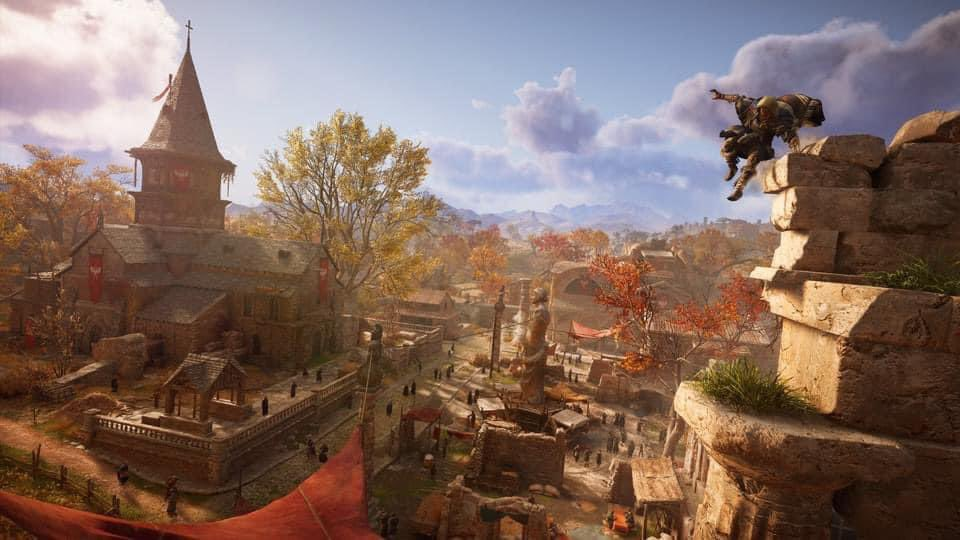 It’s a little bastion of productivity that you’ll revisit again and again, and serves as the welcome “come home” location where you’ll plan your campaign across England, and dive into side character backstories and storylines.
It’s a little bastion of productivity that you’ll revisit again and again, and serves as the welcome “come home” location where you’ll plan your campaign across England, and dive into side character backstories and storylines.
I’d love to see more variety, customization, uniqueness, and integration into the core gameplay.
“
At first, the settlement had me excited, because I love a good management experience – especially when everything offers some kind of reward to further power my character. Eventually, though, as upgrades and management started to slow down and shifted away from unlocking cool new things to getting statistical bonuses, the allure of my settlement began to dwindle and I found myself spending less on my building plans and more time just getting my shopping done before I went out to discover new interesting things. To be fair, there are strong elements at play in your settlement – like the shopkeepers and characters that live and work there which you’ll get to know and potentially care about – but I hope it’s a mechanic that Ubisoft continues to flesh it out in future Assassin’s Creeds entries because I’d love to see more variety, customization, uniqueness, and integration into the core gameplay to make me want to spend time there for reasons other than a trade and quest depot.
So, You Want to Be an Assassin?
Since Assassin’s Creed Origins, Ubisoft has continued to transplant the series from the stealth-action genre to the more wider appealing open-world action RPG landscape. It’s a change that I’ve personally really enjoyed, since a big, immersive open-world loaded with oddities and things to do punches my ticket. But it’s come with the completely fair criticism that, when you carry the existing brand into new territory, it can alienate existing fans of the series that really miss and expect that subtle, nuanced gameplay of getting in, making the kill, and getting out without being seen.
The stat-driven RPG nature of this new era of Assassin’s Creed games has made this next to impossible because assassinations are subject to leashed power based on your enemy’s level and your overall effectiveness at dealing backstab-y damage. So unless you’re building into your stealth and assassination styles heavily, and trying to backstab enemies around your same level, odds are that when you stick them with the pointy end they take a ton of damage but don’t actually die, and have to be finished off with a decidedly un-stealthy battle. I can see how that’s frustrating for anybody who misses that kind of gameplay – especially since the series continues to trend toward emphasizing combat.
I can see how that’s frustrating for anybody who misses that kind of gameplay – especially since the series continues to trend toward emphasizing combat.
Assassin’s Creed Valhalla, to Ubisoft’s credit, attempts to keep one foot on both sides, and it mostly succeeds thanks to a number of options that allow you to dial in your preferred style of play. The “vanilla” answer to this problem is in the skill tree. So if you play on the default difficulty, and default stealth difficulty (more on that in a minute), you can find ways to get closer to the original Assassin’s Creed style without going into the options menu.LoadingSpecifically, there’s a skill called Advanced Assassination that allows you to overcome enemy level difference and power imbalance as long as you hit the quick-time event prompt. I love this approach, personally, because it puts the onus on you to perform and seal the deal if your timing is right. If it’s wrong, you’re going to pay for it when the big Viking turns on you and the alarm bells sound off. That’s the definition of a high-risk, high-reward playstyle.
That’s the definition of a high-risk, high-reward playstyle.
If that’s still not close enough to home, you’re in luck, because there’s an outside gameplay tool in the options menu called Guaranteed Assassination that allows you to assassinate ALL enemies in one shot, regardless of level, every time. However, it does come with the following note: “Please note that when choosing this option, you are not playing the game as it was intended to be experienced.” So, take that as you will (it’ll probably lead to some missions being laughably easy) but know that it’s there.
Finally, if you really want to dial in your assassination experience, you’ve got some control over the difficulty settings to get you there. Just as you turn on Guaranteed Assassinations for that old-school feel, you can independently crank the combat difficulty up as far as you can stand it in order to punish yourself for getting caught. And you can tailor the stealth difficulty as well, which manipulates a number of factors in the stealth system to allow for an easier or harder approach.
So there you go. If you’ve been on the “It’s not an Assassin’s Creed game anymore” train, Valhalla has a number of stops for you to hop off at should you take a detour through the options menu.
Yes, because I like the old-school Assassin’s Creed and that’s how stabbing someone in the back should work, dammit.
No, give me the full open-world RPG. I’m a Viking, if I can’t kill someone with a hidden blade, my axes will finish the job, dammit.
Undecided, because I want to see how it goes. But I love stabbing and axing so it’s the best of both worlds.
Trying Things Out
While Valhalla faithfully sticks to the open-world script of Origins and Odyssey, there are some new systems in play, for better and worse. This time around, skill progression and abilities have been decoupled, meaning you no longer gain cool new abilities automatically simply through leveling up. In fact, the entire level system is effectively gone. Though you still earn experience, and it’s still cached at steady intervals to reward you with skill points, you don’t gain levels in the traditional format.
Though you still earn experience, and it’s still cached at steady intervals to reward you with skill points, you don’t gain levels in the traditional format.
Those skills points you earn are spent on the Skill Tree, which is more of a web, linking various clusters of unlockable upgrades into constellations that you work your way through along the three main regions: combat, stealth, and ranged. On paper it’s a good system, and slightly reminiscent of Skyrim in style, but for me it’s ultimately a step backward, for two reasons.
First, while you’ll know which direction to invest in from the start depending on what pillar you want to go toward first, once you’ve unlocked the skill at the center of the cluster you’ve got to decide which direction to move from there. Do you work toward the left, to the right? Normally you’d likely take a look at the skills further down the tree and figure out where you want to end up, but that’s the rub: every neighboring cluster is hidden by fog until you spend the necessary points to unlock the node that connects one cluster to another. What this means is you don’t know what the skill in the next group is going to be until you spend a few points to head that direction. That’s really frustrating early on, when you sink your valuable early points only to reveal a skill you don’t care about.
What this means is you don’t know what the skill in the next group is going to be until you spend a few points to head that direction. That’s really frustrating early on, when you sink your valuable early points only to reveal a skill you don’t care about.
Numbers aren’t fun. Wielding a two-handed greatsword in each hand so you’re a tornado of sharp edges? That’s fun!
“
“But there’s still value in the smaller nodes between the main skills in each constellation,” you might say, being technically correct. And that’s true. But these nodes are only minor statistical upgrades, offering “+2 to melee” or “+1 to heavy melee attacks,” for example. Those are useful, but they’re numbers. Numbers aren’t fun. Wielding a two-handed greatsword in each hand so you’re a tornado of sharp edges? That’s fun! But do you know where that skill is? Not until you stumble upon it, or just look it up online. That’s not a great experience.
Secondly, these unlockable skills at the center of the clusters are more passive, or augmentation to things you can already do, rather than the cool new abilities you’d normally find in a skill tree. Granted, a lot of them are incredibly useful – vital even – but while being able to stomp on a downed enemy or control an arrow you fire from a predator bow are very useful, they’re not as impactful as being able to light your weapons on fire or kick someone off a bridge to their doom.
Granted, a lot of them are incredibly useful – vital even – but while being able to stomp on a downed enemy or control an arrow you fire from a predator bow are very useful, they’re not as impactful as being able to light your weapons on fire or kick someone off a bridge to their doom.
Those game-changing new abilities are hidden throughout the world in books of knowledge, so unless you’re exploring and hunting them from the get-go, the big-ticket abilities may not end up in your arsenal for dozens of hours. Because of this, for the first 10 or 15 hours I felt like Valhalla’s combat was underwhelming next to Odyssey’s bombastic style and flair. I was eventually proven wrong, of course, and it became as flexible, fluid, and brutal as ever after I unlocked enough skills and found enough abilities. But the whole system is skewed toward the mid-to-late game, which left me feeling fangless for over a dozen hours. It just takes way too long to start adding complexity to combat. So if this isn’t your first Assassin’s Creed game, know that the initial scuffles can seem very bland hack-and-slash affairs until you’ve started discovering some tools in the open world.
The Best Open Worlds in Video Games
This Is My Axe; There Aren’t Many Like It, and This One Is Mine
On the other hand, I adore the new direction Ubisoft has taken inventory and quests in here. For instance, there’s far less loot in Valhalla than in Origins and Odyssey; instead of finding 400 junk-level bearded axes that you’ll inevitably sell to a merchant, Valhalla gives you different kinds of the archetypal axe, or shield, or greatsword, etc. Each weapon has a unique look, and even though two greatswords might be only slightly different statistically, they carry different passive bonuses for flavor preference. For example, one sword might do more heavy damage the more light attacks you land, while another might poison enemies you’ve knocked to the ground. Both are interesting, and useful, and offer you different ways to approach the same weapon style.
If you find one you like, you can invest collectible currencies to not only upgrade its level, which improves its stats, but upgrade the quality, and that often comes with a new visual appearance and always allows you to upgrade its level even further.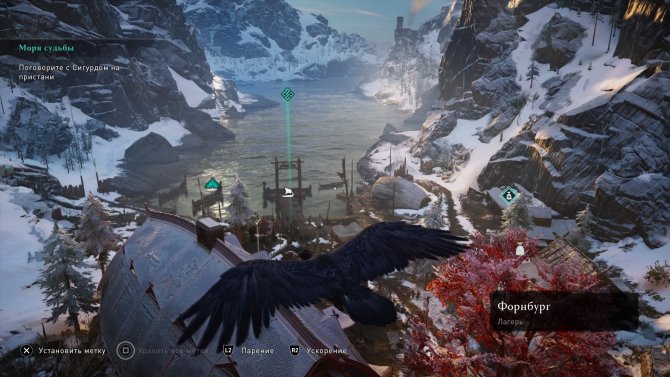 It’s much less of a hassle and more rewarding in the long run than having to sift through two pages of greatswords, and weirdly allows me to grow more attached to them.
It’s much less of a hassle and more rewarding in the long run than having to sift through two pages of greatswords, and weirdly allows me to grow more attached to them.
As a pro tip, don’t sleep on the spear.
“
And as you further augment these weapons and shields with runes, you’ll find unique combinations of attack animations depending on which hand you’re holding it in, for a nuanced system that’s so much deeper than I’d initially thought. As a pro tip, don’t sleep on the spear. I know it’s not as sexy as the big two-handed axe, but its two-handed/left-handed heavy attack lets you stick an enemy and fling them in a direction of your choosing for massive damage.
The other great change is in the greater flexibility and organic discovery of side quests and activities. Ubisoft has done away with the cascading list of side quests to track in favor of revealing colored-coded points of interest on the map for mysteries, wealth, and artifacts. Often you’ll find one of the many insane and light-hearted side stories – like one involving a crazy cat lady who happens to live next to a farmer whose field is overrun with rats (convenient!) – but it could also be a place of mystical power, a psychedelic hallucination challenge, or an ambush by bandits.
Often you’ll find one of the many insane and light-hearted side stories – like one involving a crazy cat lady who happens to live next to a farmer whose field is overrun with rats (convenient!) – but it could also be a place of mystical power, a psychedelic hallucination challenge, or an ambush by bandits.
These mysteries are, more often than not, much sillier than the main storyline, even farcical at times, but there are many that hide deeply unsettling secrets and deadly encounters. The beauty of the system is you don’t know what you’re getting into, but you’re free to walk away at any time knowing that pale dot will still be there waiting for you when and if you decide to come back. Ultimately, they’re excellent quick reprieves from the darker, heavier tones of the long, multi-part main story quests, and the freedom to pick what you want to pursue without obligation keeps the elements of surprise refreshing and engaging.
Look Back: What We Said About Assassin’s Creed Odyssey
LoadingVerdict: Assassin’s Creed Odyssey is a resounding achievement in world building, environment, and engaging gameplay with occasional problems throughout. Its incredible recreation of ancient Greece is something I’ll want to go back to long after I’ve finished its main story, and its excellent systems mesh together in a way that’s hard to beat. While there are definite rough edges, Odyssey sets a new bar for Assassin’s Creed games and holds its own in the eternal debate over the best open-world roleplaying games ever. — Brandin Tyrrel, October 1, 2018
Its incredible recreation of ancient Greece is something I’ll want to go back to long after I’ve finished its main story, and its excellent systems mesh together in a way that’s hard to beat. While there are definite rough edges, Odyssey sets a new bar for Assassin’s Creed games and holds its own in the eternal debate over the best open-world roleplaying games ever. — Brandin Tyrrel, October 1, 2018
Score: 9.2
Read the full Assassin’s Creed Odyssey Review
Glitch in the Animus
No matter where you go in Assassin’s Creed Valhalla, though, you’re sure to encounter some… let’s call them quirks. Everyone and everything here is fighting a common foe: a large number of bugs and technical hiccups that span the spectrum of hilarious, annoying, frustrating, and downright broken.
I’ve run into half a dozen hard crashes that returned me to the Xbox dashboard. I’ve cursed out loud at ore deposits and door barricades that just refused to break thanks to the attack animation of whatever weapon I was holding not connecting perfectly, I guess? I’ve avoided a number of staircases that snag you halfway up and refuse to let you do the one thing they were made to do. I’ve stood perfectly still as enemies ran tight, fast circles around me, or brazenly ignored the arrows I’ve buried in their heads. I’ve ridden nitro-powered rowboats that take flight whenever you dash onto the shore, and restarted Valhalla because quest progression came to a grinding halt when a vital NPC got stuck in a river or decided to just never move to begin with. I’ve looked past lingering HUD elements that overlap or stay on screen. I’ve raged against enemy Zealots – Valhalla’s version of mercenaries – that inexplicably regained health even when I was drowning them in a river or beating them to death with my bare hands, becoming effectively immortal. And friends, I swear to you, I’ve seen a flying whale.
I’ve stood perfectly still as enemies ran tight, fast circles around me, or brazenly ignored the arrows I’ve buried in their heads. I’ve ridden nitro-powered rowboats that take flight whenever you dash onto the shore, and restarted Valhalla because quest progression came to a grinding halt when a vital NPC got stuck in a river or decided to just never move to begin with. I’ve looked past lingering HUD elements that overlap or stay on screen. I’ve raged against enemy Zealots – Valhalla’s version of mercenaries – that inexplicably regained health even when I was drowning them in a river or beating them to death with my bare hands, becoming effectively immortal. And friends, I swear to you, I’ve seen a flying whale.
No matter where you go in Assassin’s Creed Valhalla, though, you’re sure to encounter some… let’s call them quirks.
“
Lastly, I don’t know if this is a bug or just a result of the developers wanting you to be able to do cool aerial attacks, but the fact you can survive a 100-foot fall by performing an attack in mid-air seems like the former.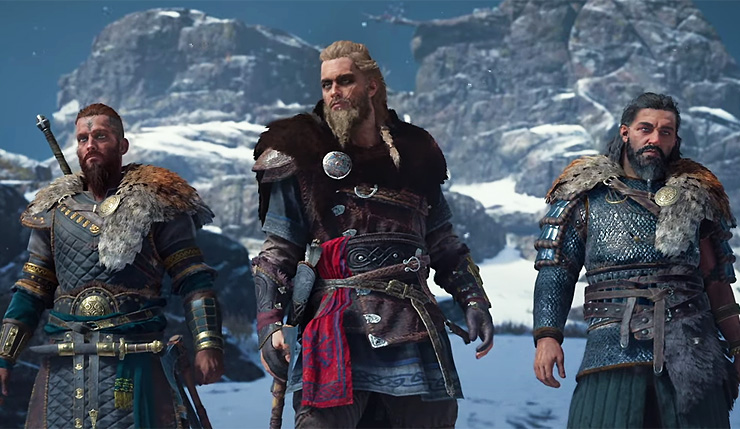 I’m not complaining, it helps speed up getting from point A to point B when I don’t want to look for a safe landing space, but it’s just so odd.
I’m not complaining, it helps speed up getting from point A to point B when I don’t want to look for a safe landing space, but it’s just so odd.
Anyway, you get it. Valhalla is buggy – really buggy. That said, it wasn’t overpowering; looking back after over 60 hours played, all those nagging issues feel like small footnotes in what’s otherwise been many great hours of exploration and discovery. And, in the moment, I think it’s easy to miss out on the forest for the trees. So while I may never forget that flying whale, it’s not the first, or second, or even tenth thing I think about when I think of Assassin’s Creed Valhalla.
Assassin’s Creed Valhalla is a big, bold, and ridiculously beautiful entry to the series that finally delivers on the much-requested era of the Viking and the messy, political melting pot of England’s Dark Ages. It walks a fine line between historical tourism, top-shelf conspiracy theory, and veiled mysticism against the backdrop of a grounded and focused story.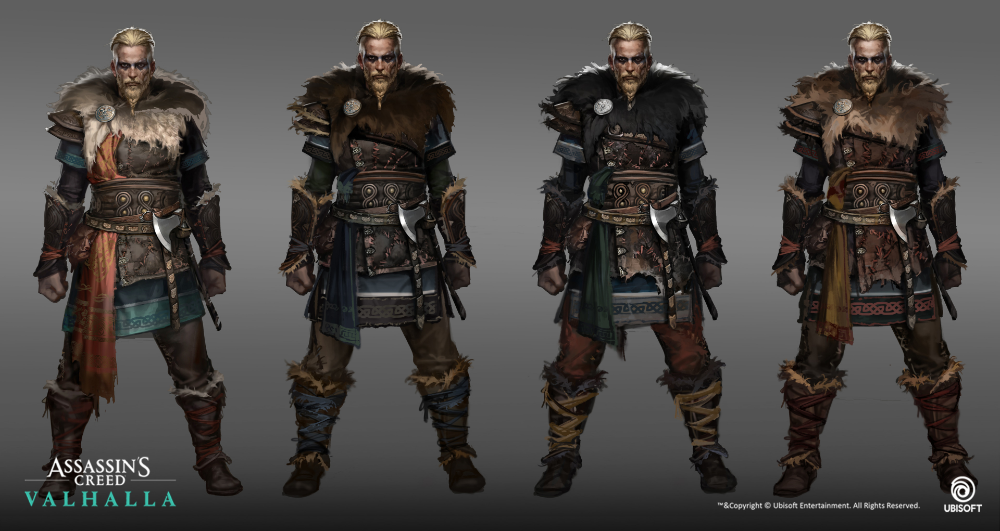 Fresh takes on several of the series’ established loot and quest systems help to keep the things fluid and nuanced, though progression could use refinement. There’s also a bigger than usual horde of bugs and blemishes to contend with from start to finish. But while it may not be the most stylish or polished, its rugged and brutal look at the muddy business of Scandanavian expansion is as memorable and dense as an Assassin’s Creed has ever been, and it makes great use of the new consoles.
Fresh takes on several of the series’ established loot and quest systems help to keep the things fluid and nuanced, though progression could use refinement. There’s also a bigger than usual horde of bugs and blemishes to contend with from start to finish. But while it may not be the most stylish or polished, its rugged and brutal look at the muddy business of Scandanavian expansion is as memorable and dense as an Assassin’s Creed has ever been, and it makes great use of the new consoles.
Assassin’s Creed Valhalla review | PC Gamer
Our Verdict
Bloody and captivating, Valhalla is Assassin’s Creed at its best.
Why you can trust PC Gamer
Our expert reviewers spend hours testing and comparing products and services so you can choose the best for you. Find out more about how we test.
Need to know
What is it? An enormous Viking RPG
Expect to pay $60
Developer Ubisoft
Publisher:Ubisoft
Reviewed on i7 8700, RTX 2070, 16GB RAM
Multiplayer? No
Out November 10
Link assassinscreed. com
com
£14.29
View at CDKeys
View at Amazon
View at Argos
Assassin’s Creed Valhalla is my favorite Assassin’s Creed, which is saying something considering it’s a series that spans 23 games. It builds on the already excellent RPG foundations laid by Origins and Odyssey, but with meaningful improvements that iron out many of the frustrations I had with both games. Case in point: Not once during the 60-hour story was I told to stop and level up a bunch before I could take on the next quest. That also means Ubisoft isn’t selling optional experience boosts, either. Thank god.
What really stands out to me, though, is how much better Valhalla is at telling an engaging story that twists and turns according to my decisions. In Odyssey, my choices sometimes felt arbitrary or confusing, but Valhalla does a great job of introducing characters, concepts, and themes, and then forcing me to decide how Eivor, the main character, relates to them. When one of my beloved own clansmen betrayed me and tried to take my life, I had no choice but to kill them in self defense. But I agonized for almost a full minute over whether to let them grasp their axe with their dying breath or kick it away, denying them entrance into Valhalla. I had come to love this character and their betrayal was upsetting, but does that justify denying them an eternity in heaven?
When one of my beloved own clansmen betrayed me and tried to take my life, I had no choice but to kill them in self defense. But I agonized for almost a full minute over whether to let them grasp their axe with their dying breath or kick it away, denying them entrance into Valhalla. I had come to love this character and their betrayal was upsetting, but does that justify denying them an eternity in heaven?
Ragnarökin’
What really impresses me, though, is how consistently great the story is throughout the entire adventure.
Set during the Viking Invasion of England, the story follows Eivor and her adoptive brother Sigurd, two fierce Norse warriors chasing glory. Like Odyssey, Eivor can be played as either a man or a woman, but what’s great is you can now switch between them freely to test which one suits you instead of being locked into that choice from the outset. Whichever Eivor you play as, the story unfolds in mostly the same way. Sigurd was supposed to be made a local king, but the unification of Norway under King Harald leaves him two choices: Bend the knee or leave. Unwilling to give up his dream of ruling, Sigurd convinces Eivor and much of his clan to abandon Norway and sail to England so they can violently carve out a new future.
Unwilling to give up his dream of ruling, Sigurd convinces Eivor and much of his clan to abandon Norway and sail to England so they can violently carve out a new future.
The anchor of this story is my settlement, called Ravensthorpe, which expands slowly over time as I gather new resources and construct new buildings. Like Dutch’s camp in Red Dead Redemption 2, the settlement is my home base that I return to frequently in between quests. New buildings unlock new upgrades, like a forge so I can enhance my equipment or a brewery so I can host feasts that give me a temporary buff to my stats. As the settlement expands, it draws new characters, sidequests, and even the opportunity for romance. When huntress Petra asked me to help her look for her missing brother, for example, we ended up accidentally tripping on some magic mushrooms we found and chasing forest creatures instead. Like any good trip, we bonded and became lovers a few dates later.
Even though many of the characters aren’t as fully realized and vivid as in Red Dead Redemption 2, I love how Valhalla’s settlement encourages me to get to know my clan. Instead of completing side quests for random strangers I find while exploring, like in Odyssey, I’m helping my blacksmith find a wife, or my museum curator settle a feud. Each one is a narrative thread that, woven together, tells the collective story of the Raven clan.
Instead of completing side quests for random strangers I find while exploring, like in Odyssey, I’m helping my blacksmith find a wife, or my museum curator settle a feud. Each one is a narrative thread that, woven together, tells the collective story of the Raven clan.
Most of the story is concerned with what’s happening outside the borders of my settlement, however. In order to cement a permanent place in England, Eivor and Sigurd have to negotiate alliances with the various Viking tribes (and the occasional Saxon king). This is all centered around an Alliance Map, where I choose which region I want to venture to, participating in a somewhat self-enclosed series of quests to win the favor of whichever faction happens to be there.
At first this structure seemed too templated and isolated, but once the story gets going characters from one region will pop up in the story of another, giving a nice sense of continuity between these otherwise independent chapters. What really impresses me, though, is how consistently great the story is throughout the entire adventure, even as it takes astounding detours to places far beyond England and Norway.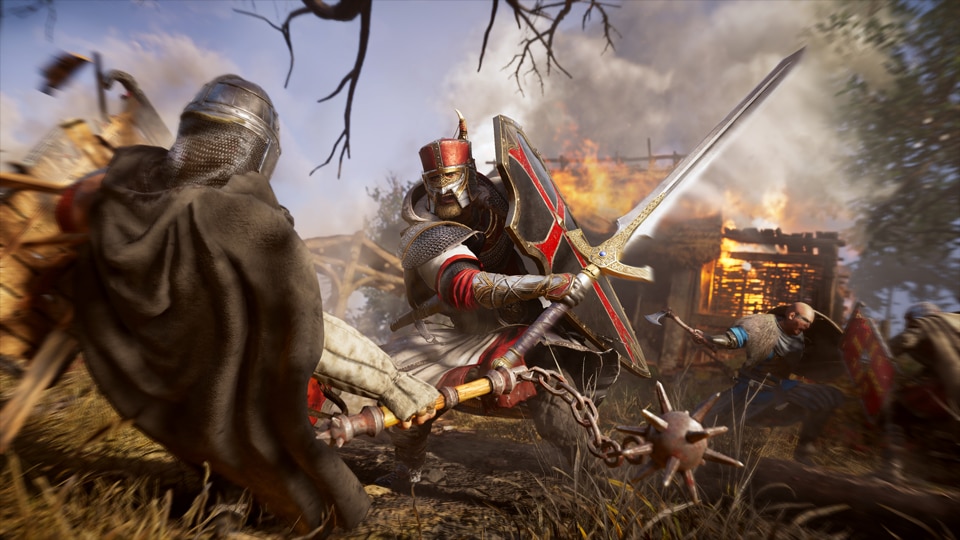 That’s something I can’t really say for any other Assassin’s Creed games, including Odyssey.
That’s something I can’t really say for any other Assassin’s Creed games, including Odyssey.
It takes a while before it all starts to come together, but Ubisoft does a great job juxtaposing my relationships with Sigurd and the rest of the Raven clan with the much more epic sagas as I wage war on Picts with the legendary Halfdan Ragnarsson, establish puppet kings with Ivar the Boneless, or trade veiled threats with Aelfred, King of Wessex. All the while, dialogue choices poke and prod the rigidity of Norse culture and traditions with surprising nuance. It’s hard to explain without spoiling specific moments, but Valhalla has some wickedly knotted moral conundrums. There were a dozen or more times I stared at dialogue choices, completely stumped over which option was right.
Blood and glory
There are still some moments where Valhalla feels like a bad Game of Thrones episode, though. Entire armies show up undetected at a moment’s notice, and characters will inexplicably change sides in a conflict just to reveal they’re actually a part of the Templar order—the overarching villains of the Assassin’s Creed mythos.
These cutscenes are relatively few and far between, and ultimately this is a game about two warring cults reliving historical simulations to uncover mythological artifacts in the modern day—a bit of cheese is expected. But, and I can’t believe I’m about to say this, Valhalla even makes Assassin’s Creed’s sloppy overarching meta-narrative interesting again. Without spoiling anything, the final two hours are a whirlwind of revelations with implications that stretch all the way back to the first game. God help me, I actually want to see what happens next.
Image 1 of 4
(Image credit: ubisoft)(Image credit: ubisoft)(Image credit: ubisoft)(Image credit: ubisoft)
Raiding feels like a shallow feature clumsily stitched onto the rest of the game.
I love that the Norwegian invaders are portrayed as so much more than vicious barbarians, but it also ignores more troubling aspects of that era of history completely. It feels like a wayward extension of Ubisoft’s feeble reluctance to admit its games have political messages.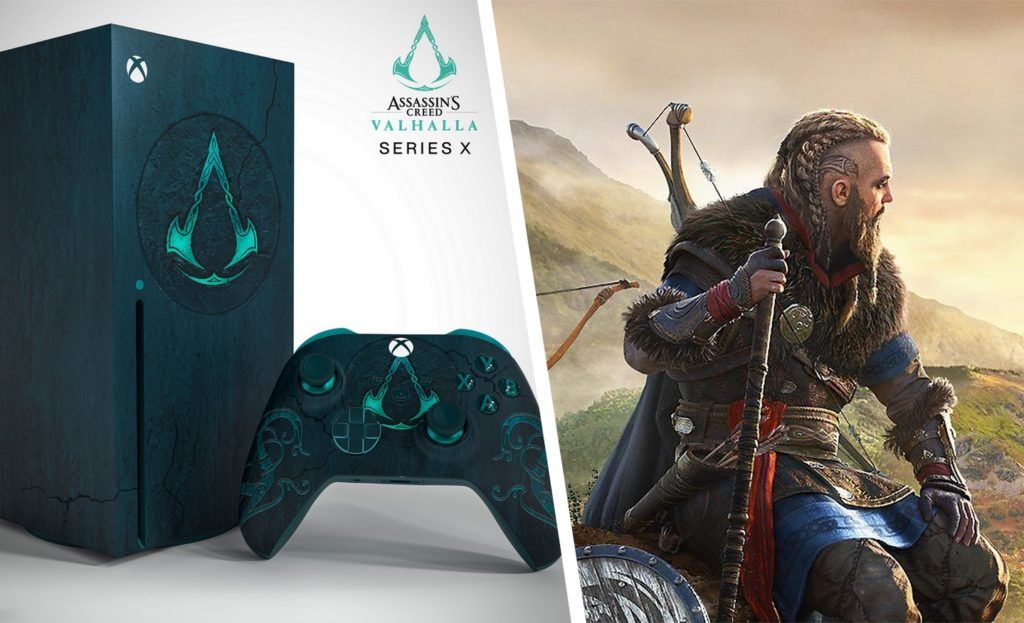
Take raiding, for example. To gather resources to expand my settlement, I have to pillage Christian monasteries dotted along the various riverways of England’s different kingdoms. The first few times I did this, it was exhilarating: My soldiers stormed the town, hurling torches onto thatched-roof cottages, slaughtering the guards, breaking windows, shattering pots and crates, and helping me kick down doors to get at more valuable loot. But god help you if you kill an unarmed clergyman, even by accident. Kill too many and it’s game over. Burning their entire lives to the ground, however, is totally OK.
I’m not saying Valhalla should gleefully reward you for butchering Christians, but including a hard rule against it feels like Ubisoft intervening just to wag a finger in my face. It’s even stranger when I start a quest with a Saxon lord who completely ignores the fact that I pillaged every church in his lands on the way to meet him. It makes raiding feel like a shallow feature clumsily stitched onto the rest of the game rather than something incorporated into and accounted for by the story.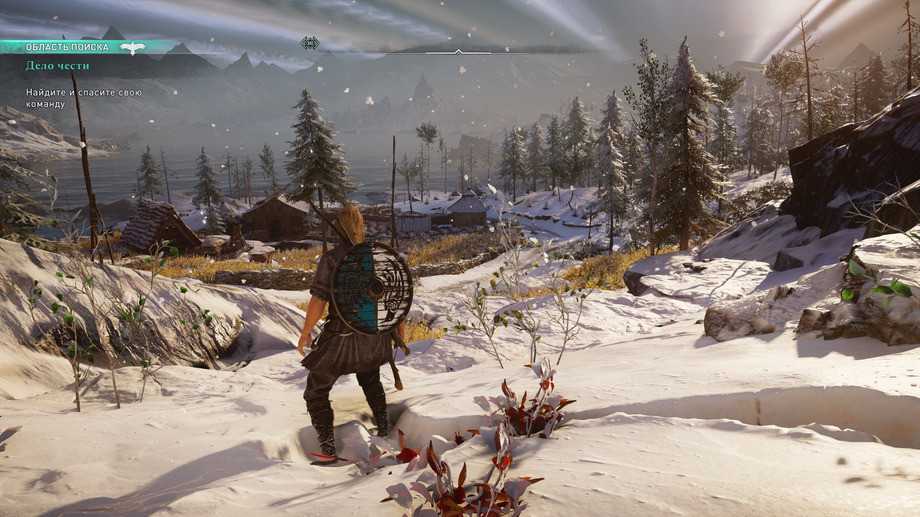 Ubisoft could’ve invented a narrative reason why Eivor doesn’t kill innocents or just made priests really good at dodging thrown axes when they’re fleeing for the hills. Instead I’m given a warning message that completely pulls me out of the moment.
Ubisoft could’ve invented a narrative reason why Eivor doesn’t kill innocents or just made priests really good at dodging thrown axes when they’re fleeing for the hills. Instead I’m given a warning message that completely pulls me out of the moment.
I have a similar problem with Valhalla’s Assaults—the big set piece castle sieges that typically act as the climax of a given regional questline. I’d never expect Ubisoft to go to the pains of simulating a full battle from start to finish, but the illusion of participating in one is paper thin. I’ll use a battering ram to smash down the castle gate only to find my own soldiers are inexplicably already inside the castle and locked in never-ending mock combat with enemy soldiers. There’s no sense of a battle having an ebb and flow, and so long as I complete my objectives the fight will progress in my favor.
Axe, meet skull
Both of these issues would be a lot more frustrating if combat weren’t so much fun. The system is similar to Odyssey’s in a lot of ways, but much more satisfying. For example, I can now dual-wield any two weapons, changing my combat style while also giving me access to special moves unique to my offhand weapon. Playing on a harder difficulty, I immediately favored the traditional axe and shield for the extra defense. But then I unlocked an ability on Valhalla’s skill tree that let me dual-wield two-handed weapons. What a game changer.
For example, I can now dual-wield any two weapons, changing my combat style while also giving me access to special moves unique to my offhand weapon. Playing on a harder difficulty, I immediately favored the traditional axe and shield for the extra defense. But then I unlocked an ability on Valhalla’s skill tree that let me dual-wield two-handed weapons. What a game changer.
Instead of sporting a measly axe, I’m holding a two-handed battle axe in one hand and a massive spear in the other—or I can hold two spears and be extra stabby, or two shields and be extra shieldy. It’s so much fun discovering all of these combinations. And no matter what weapons I choose, I know I’m going to be both horrified and amazed at just how artfully Eivor can use them to separate people from their limbs.
It’s hard to overstate just how gnarly some of the finishing movies are. I’ve repeatedly knocked enemies down and then impaled them on their own spears, or chopped their hands off as they raised them to defend against the axe I was about to lodge in their skull. There’s even one where Eivor sticks an axe in a guy’s face and then punches his head off. It’s exactly what you’d hope for in a game about Vikings.
There’s even one where Eivor sticks an axe in a guy’s face and then punches his head off. It’s exactly what you’d hope for in a game about Vikings.
Of course, stealth is still an option, but it’s quickly becoming the most antiquated part of Assassin’s Creed—if only because so little of it has changed. Valhalla brings back some cool features like being able to blend into crowds to avoid guards and creating distractions to draw them away, but I’m often frustrated by how shitty the AI continues to be. Guards are dumb, and you can easily lure them into bushes one after another to assassinate them, and when one does spot you it feels like every guard within five miles immediately knows where you are. These are the same problems I’ve had in every Assassin’s Creed, sure, but they’re still annoying. At least Valhalla is more willing to let me forgo stealth entirely in all but a few quests. Being a sneaky Viking doesn’t feel appropriate, anyway.
How does it run?
On my i7 8700 and RTX 2070, I’m getting 60-70 fps using 1440p and high settings. There’s occasional dips, but overall I’m impressed with Valhalla’s performance. It’s absolutely gorgeous, too.
There’s occasional dips, but overall I’m impressed with Valhalla’s performance. It’s absolutely gorgeous, too.
Like most Ubisoft games, though, this might not be your experience. Other members at PC Gamer had to really mess with options for a long time just to get stable performance, and Valhalla demands a beefy system if you hope to get remotely good framerates. Even with top-tier hardware, expect to spend some time messing with the different options and a few hiccups. If your CPU or GPU are a few generations old, you’ll have to make some compromises.
The combat isn’t all just flash, though. There are 23 different human enemy types that each have their own distinct weapons and combat styles, which makes fights feel dynamic and often quite challenging. It’s more varied than any other Assassin’s Creed. Rogues will kick dirt in your eyes to blind you, while Ceorl’s will swap weapons with dead allies, ‘Berserkirs’ will pelt you with thrown axes while they run you down. Knowing the attack patterns and timing of these enemies takes patience and skill.
Fortunately, Eivor has more tools than just the weapons she wields. While exploring, special books can be found that unlock new abilities, like being able to set your weapon on fire or a harpoon you can use to yank enemies off cliffs. This, coupled with a skill tree that recalls Path of Exile—hundreds of nodes that offer incremental stat boosts mixed with bigger ability unlocks—makes customizing Eivor really fun.
This all feeds back into the open world exploration, which remains largely untouched from Odyssey saved for a few improvements. The map is still littered with icons in typical Ubisoft fashion, but you can (and should) turn that all off in the options so that you can explore without signposts everywhere. Most of the stuff you’ll find is new equipment and treasure you can take back home or use for upgrades, but I also found hidden caves with challenging puzzles, secret boss battles, and weird little one-off quests that are often bizarre and sometimes hilarious. One time I happened upon a Viking who didn’t realize he had an axe lodged in his skull.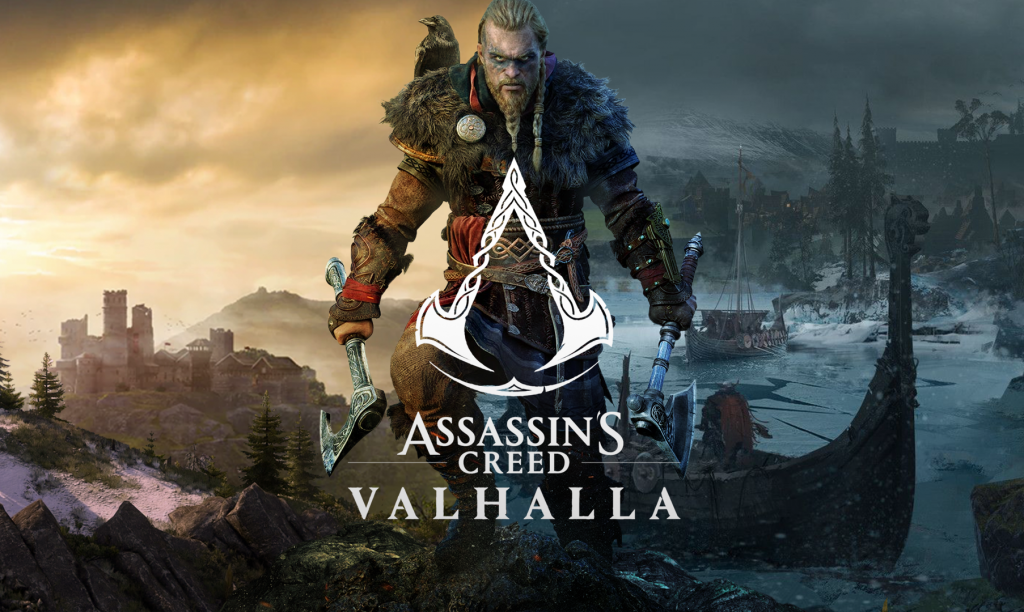 He asked me what he should do so I offered to remove it, and he died instantly. That was it. Quest completed, I guess?
He asked me what he should do so I offered to remove it, and he died instantly. That was it. Quest completed, I guess?
Valhalla succeeds on so many levels that it’s easy to forgive the times when it doesn’t.
These activities all reward you with skill points you can spend in the skill tree. But, like I said earlier, Valhalla doesn’t use this as a way to gate your progress through the story. Different regions still have power levels you have to match if you hope to survive the enemies there, so you can’t go anywhere you want right away. But aside from doing a little exploring, I mostly blitzed through the story without ever feeling forced to go off and do something else to level up.
These little improvements go a long way in making Valhalla more inviting and fun than Odyssey. Assassin’s Creed’s transformation into a full-blown RPG hasn’t been the cleanest one, especially as features like stealth feel left to stagnate while other aspects get so much better. But Valhalla succeeds on so many levels that it’s easy to forgive the times when it doesn’t. It’s an enormous game, and it’ll probably take me another 20 hours to finish everything I still haven’t completed. I honestly can’t wait.
But Valhalla succeeds on so many levels that it’s easy to forgive the times when it doesn’t. It’s an enormous game, and it’ll probably take me another 20 hours to finish everything I still haven’t completed. I honestly can’t wait.
- AC Valhalla guide : 6 top tips
- AC Valhalla romance : Find love in Dark Ages Britain
- AC Valhalla armor : The best you can find
Assassin’s Creed Valhalla: Price Comparison
£53.99
£14.29
View
Reduced Price
£14.52
View
£34.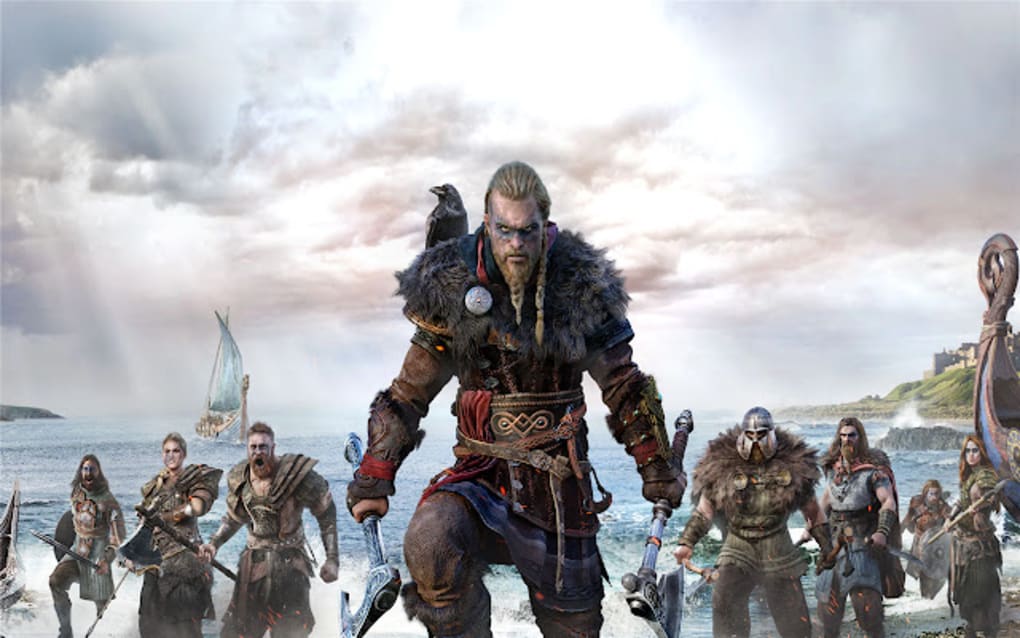 99
99
£14.95
View
Reduced Price
£19.99
View
£27.95
View
Show More Deals
powered by
Read our review policy
Assassin’s Creed Valhalla
Bloody and captivating, Valhalla is Assassin’s Creed at its best.
With over 7 years of experience with in-depth feature reporting, Steven’s mission is to chronicle the fascinating ways that games intersect our lives. Whether it’s colossal in-game wars in an MMO, or long-haul truckers who turn to games to protect them from the loneliness of the open road, Steven tries to unearth PC gaming’s greatest untold stories. His love of PC gaming started extremely early. Without money to spend, he spent an entire day watching the progress bar on a 25mb download of the Heroes of Might and Magic 2 demo that he then played for at least a hundred hours. It was a good demo.
His love of PC gaming started extremely early. Without money to spend, he spent an entire day watching the progress bar on a 25mb download of the Heroes of Might and Magic 2 demo that he then played for at least a hundred hours. It was a good demo.
Assassin’s Creed Valhalla review. It ran down my mustache, but it didn’t hit my mouth — Gambling
Congenial
The series “ Vikings ”
I’ll immediately warn you about two things: firstly, I can’t call myself a hardcore fan of Assassin’s Creed . I played most of the titles in the series, but only a few went to the end, and the two previous parts of the modern «RPG trilogy», Origins and Odyssey , did not hook me at all. Therefore, on the one hand, I am not an expert on lore, and on the other hand, I look at the series with a more or less fresh, not yet blurred look, because I am not tired of the gameplay formula of the last parts. nine0003
Secondly, I liked Assassin’s Creed Valhalla more than I expected. I did not expect anything outstanding against the background of the last game and, in general, did not get it, but still I was pleasantly surprised. The only question is whose merit it is: Ubisoft Montreal , which took up the mind, or the scriptwriters of the series «Vikings» , from whom the studio wrote off homework.
I did not expect anything outstanding against the background of the last game and, in general, did not get it, but still I was pleasantly surprised. The only question is whose merit it is: Ubisoft Montreal , which took up the mind, or the scriptwriters of the series «Vikings» , from whom the studio wrote off homework.
Some of the screenshots in the text were taken on the PC version
0010
No, I am in no way devaluing the work of the developers: despite all the similarities (both good and not so) of Valhalla with the Odyssey, she has her own finds worthy of praise. It’s just that it’s not them that attract attention in the first place, but what the authors shamelessly borrowed, albeit indirectly, from the show of the channel History — the narration and setting.
Assassin’s Creed Valhalla tells the saga of Eivor, nicknamed the Brother (or Sister!) of the Wolf, a Viking who lost his family due to betrayal at an early age.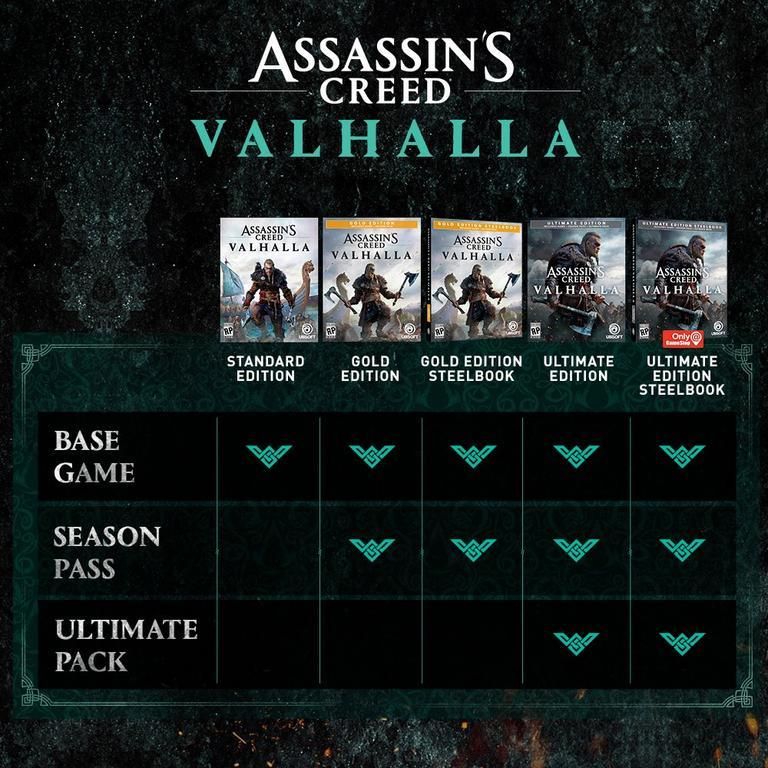 The orphan was taken under the wing of the Raven clan, where the child grew up and over the years grew into one of the most formidable warriors of the North. Together with his half-brother Sigurd, Eivor gathers a small detachment of like-minded people and goes to England — in search of glory, freedom and treasures. nine0003
The orphan was taken under the wing of the Raven clan, where the child grew up and over the years grew into one of the most formidable warriors of the North. Together with his half-brother Sigurd, Eivor gathers a small detachment of like-minded people and goes to England — in search of glory, freedom and treasures. nine0003
For most of the plot of Valhalla, the story unfolds in front of us not about assassins, Templars, ancient prophecies and great deeds, but about ordinary people who in an instant abandoned their old life to start a new one. From scratch, without any guarantees, in completely unfamiliar conditions. English lands, of course, are more fertile and warmer than the snow-covered fjords of Norway, but you can’t call them paradises either. The country, fragmented into many small kingdoms, had previously suffered from internecine wars, and with the advent of Ragnar Lothbrok and the Danish hordes, it drowned in blood: the Danes plundered and burned a good half of England. nine0003
It is not surprising that the locals are not too happy about the new neighbors who have arrived on longships. Eivor, the right hand of Jarl Sigurd, needs to take care of the well-being and safety of his new home — the settlement of Ravensthorp in the heart of Mercia. And for this it is important not only to develop the infrastructure, but also to settle some political nuances. Make alliances with peaceful clans on the mainland, pacify violent ones and create at least a semblance of friendship with the British: allies are worth their weight in gold here.
Eivor, the right hand of Jarl Sigurd, needs to take care of the well-being and safety of his new home — the settlement of Ravensthorp in the heart of Mercia. And for this it is important not only to develop the infrastructure, but also to settle some political nuances. Make alliances with peaceful clans on the mainland, pacify violent ones and create at least a semblance of friendship with the British: allies are worth their weight in gold here.
In pursuit of the sun and moon
In other words, this time the story turned out to be much more mundane than before — and this is where the influence of the Vikings is most noticeable. There is nothing wrong with this — on the contrary, within the framework of the series, the plot, where so much attention is paid to domestic politics and undercover intrigues, is perceived unexpectedly fresh. However, those who for some reason expected assassins from the game with the subtitle Valhalla are predictably at risk of being left out. Technically, they are present in the plot and play an important role in the development of events, but the key word here is “technically”. Leapfrog with secret orders is pushed far into the background in the adventures of Eivor: formally, he helps the Assassins, but in fact undermines the hegemony of the Templars in passing, just in between. Even the symbol of brotherhood — the hidden blade — he receives as a gift. Moreover, he defiantly wears it on the outside of his wrist: he’s not a fool to say goodbye to his ring finger like that for no reason. nine0003
Technically, they are present in the plot and play an important role in the development of events, but the key word here is “technically”. Leapfrog with secret orders is pushed far into the background in the adventures of Eivor: formally, he helps the Assassins, but in fact undermines the hegemony of the Templars in passing, just in between. Even the symbol of brotherhood — the hidden blade — he receives as a gift. Moreover, he defiantly wears it on the outside of his wrist: he’s not a fool to say goodbye to his ring finger like that for no reason. nine0003
Roughly the same situation with the storyline in the present. Running around with the staff of Hermes and saving the world from another apocalypse is given just a few scenes at the beginning and end of the game, with the exception of the traditional anomalies of the Animus. Naturally, the parallel plots intersect by the end, but… Considering how little time is given to Leila and the company, the nonsense characteristic of the sci-fi series here looks like an optional appendage to the historical drama.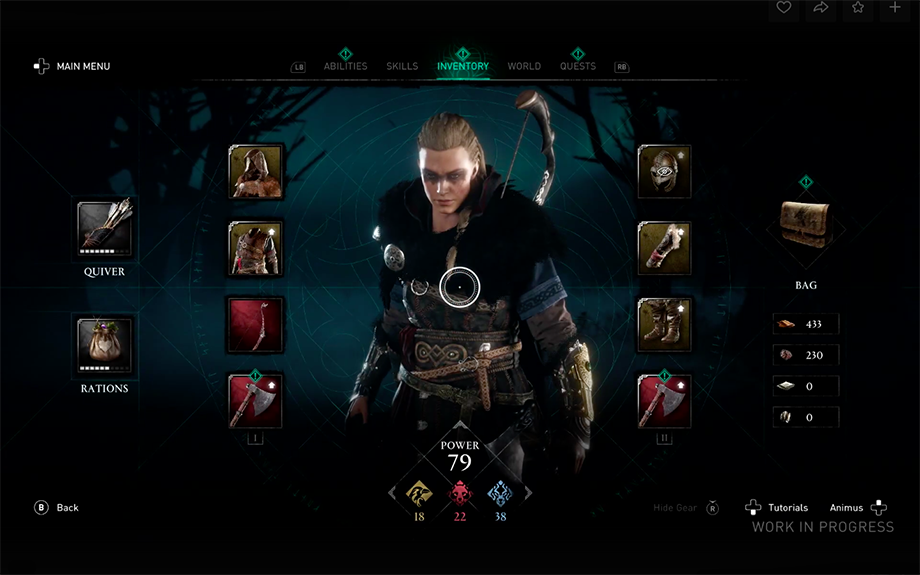
I, again, have no problems with this: everything has been moving towards this for a long time, so the developers have taken a completely logical step. And it certainly would have worked, but the story progression in the game is arranged in such a way that without intertemporal interruptions, the narrative quickly becomes predictable and begins to seriously tire. nine0003
Here’s the thing. The world of Valhalla is divided into separate regions-kingdoms-principalities, and each has its own story arc. You choose the place you need on the strategic map in the settlement, start the quest chain and move forward. Eivor solves local problems, enlists the support of those in power, and returns home with good news. And between these arches, a global plot is periodically wedged — the story of Eivor and Sigurd directly. It turns out a little tough, but concise gameplay loop with a clear structure. I chose a region, disappeared there for several hours, returned to Ravensthorpe, watched cutscenes and drove off in search of adventure to the next area. nine0003
nine0003
Although the social stealth with hide and seek in the crowd has returned to the game for the first time in a long time, it is not necessary to use it. Stealth in Valhalla does not provide any advantages, and no one punishes mistakes for mistakes. At a certain point — after thirty hours of the game — events are clearly gaining momentum for a climax, and, no joke, you can’t wait to find out what everything will turn into … but you have to wait just as much, if not longer, for a spectacular denouement. Because history is served drop by drop a year — and mostly strictly between the sweeping of endless principalities. As a result, the Valhalla scenario feels unbearably drawn out, and therefore the conflict and well-twisted (by the standards of Assassin’s Creed) intrigue suddenly fizzle out. nine0003
The stories of Eivor’s allies are often almost unrelated to the global plot, which is why it develops catastrophically slowly — and, even worse, monotonously. With rare (albeit very glaring) exceptions, quest chains in different parts of the world are like two peas in a pod.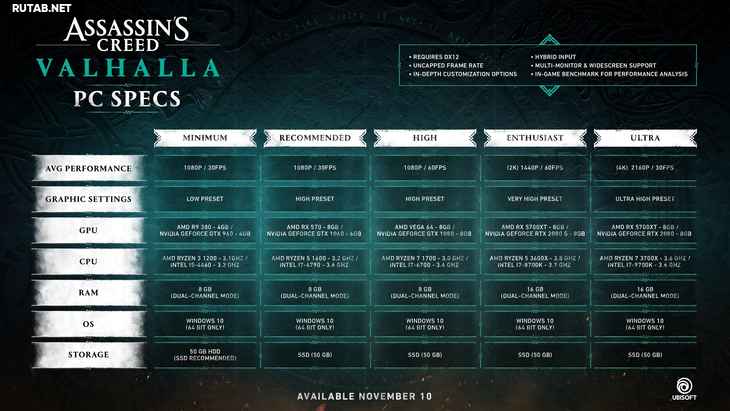 Each time you need to make a coup in order to seat a ruler loyal to the Vikings on the throne (less often, to help an already loyal one). Each time it turns out that the task is not as simple as it seems, and everything does not go according to plan. Each time, everything inevitably ends either with a mass slaughter, or with the storming of another fortress, where the “villain” dug in. Wherever you go, you will have to deal with approximately the same things, approximately according to the same scheme — I already went through the final segments of the game somehow, through force, barely understanding what I was doing and why. That is, of course, it is clear why: to gather allies. But for what? What’s at stake? Why should I care if even the game is not interested in its own story? nine0003
Each time you need to make a coup in order to seat a ruler loyal to the Vikings on the throne (less often, to help an already loyal one). Each time it turns out that the task is not as simple as it seems, and everything does not go according to plan. Each time, everything inevitably ends either with a mass slaughter, or with the storming of another fortress, where the “villain” dug in. Wherever you go, you will have to deal with approximately the same things, approximately according to the same scheme — I already went through the final segments of the game somehow, through force, barely understanding what I was doing and why. That is, of course, it is clear why: to gather allies. But for what? What’s at stake? Why should I care if even the game is not interested in its own story? nine0003
Secondary characters are not particularly memorable, although Ivar the Boneless, suspiciously similar in character and habits to Vaas Montenegro, at least amuses
Not my brother, Scandinavian pagan seriously claimed that The Division 2 and Far Cry 5 are far from politics, looks even funnier. Four months ago, after playing a small segment of Valhalla at a press show, I already noted that the studio diligently sidesteps the most inconvenient aspects of the real story. Everything is true, but in the release version of the game the situation is even more absurd: the Vikings are pathologically incapable of making mistakes, and the damned Anglo-Saxons, on the contrary, are always wrong. nine0003
Four months ago, after playing a small segment of Valhalla at a press show, I already noted that the studio diligently sidesteps the most inconvenient aspects of the real story. Everything is true, but in the release version of the game the situation is even more absurd: the Vikings are pathologically incapable of making mistakes, and the damned Anglo-Saxons, on the contrary, are always wrong. nine0003
Is Eivor sacking the monasteries? Well, it’s out of dire need to get resources to develop the settlement. And in general: the accumulation of wealth is not Christian, so the Crow clan is doing the Catholics a favor. Eivor without hesitation kills hundreds of Englishmen and burns the houses of the peasants? It is their own fault that they dared to defend their native lands from foreign invaders, they could just shrug their shoulders and lay down their arms. Eivor overthrows legitimate monarchs and puts puppets in their place? Under the new rulers, the people who previously hated the Danes, as if by magic, begin to live happily ever after. Brother Wolf never asks questions of ethics, and the game only a couple of times gathers the courage to condemn the raider way of life through the mouths of some NPCs. But even in this case, the position of the British is presented as if they were just grumbling over nonsense. Well, that’s right: otherwise, the hour is not even, the hero will turn into an anti-hero, who cannot always be sympathized with. nine0003
Brother Wolf never asks questions of ethics, and the game only a couple of times gathers the courage to condemn the raider way of life through the mouths of some NPCs. But even in this case, the position of the British is presented as if they were just grumbling over nonsense. Well, that’s right: otherwise, the hour is not even, the hero will turn into an anti-hero, who cannot always be sympathized with. nine0003
Raids on monasteries quickly become boring, but at first they make a strong impression. Music, battle cries, the sound of a horn — adrenaline rushes over the edge
However, the extremely skillful construction of the world saves the narrative from complete failure. Although almost all hostile Anglo-Saxons (and not only them) are depicted as caricatured Disney villains, the developers showed ordinary people as extremely humane. Assassin’s Creed Valhalla is almost the only game in the series where the traditional disclaimer, reminding that the project was created by a “multicultural team”, takes on real, and not just PR, meaning.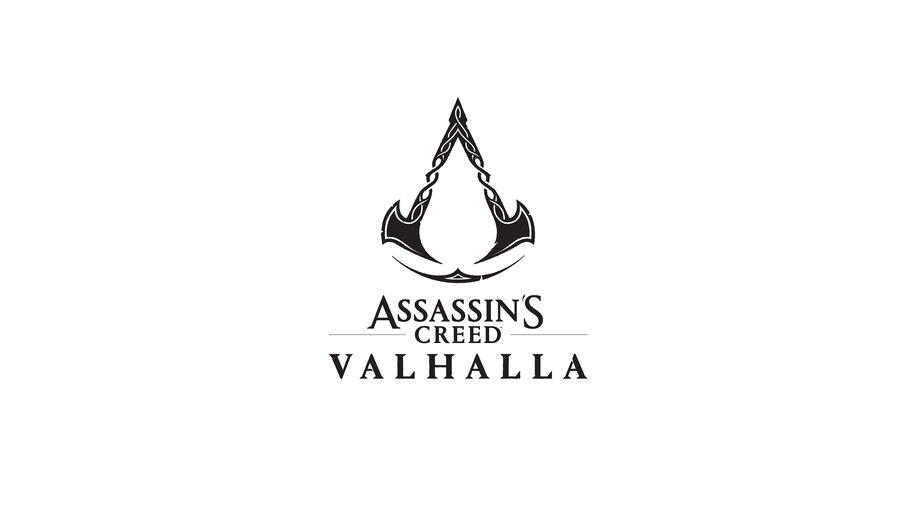 Because not abstract English people live in England, but many different peoples — and the authors honestly try to show their features, similarities and differences. The world here is revealed not only in battles: bloody battles for the glory of Odin are only part of the adventure. nine0003
Because not abstract English people live in England, but many different peoples — and the authors honestly try to show their features, similarities and differences. The world here is revealed not only in battles: bloody battles for the glory of Odin are only part of the adventure. nine0003
In one of the story arcs, Eivor finds himself in a Celtic village where Samhain is celebrating, and unexpectedly walks from house to house with pleasure, begging for sweets, dressed up as a spirit. Well, it’s just like raids, only people themselves give you trophies! In another arc, where you need to help with the funeral of the old jarl, the grieving Danes threaten with reprisal the unfortunate Anglo-Saxon: he sprinkled the body of the deceased with holy water, so that if the jarl was suddenly not accepted into Valhalla, he would end up in Christian paradise. When Eivor and his raiders sail past the monastery for the first time, the Drakkar crew wonders: who in their right mind would worship the cross on which their god was killed? And after several plot fights, you need to decide whether to put his ax into the hands of a defeated enemy — the way to Valhalla is ordered for drengs without weapons. What is stronger: your dislike for a person or respect for a fallen warrior? nine0003
What is stronger: your dislike for a person or respect for a fallen warrior? nine0003
Points of interest are also intelligently linked to the cultural characteristics of the setting. Temples of the Druids, sacrificial altars, stone circles, cairns where you need to build pyramids of cobblestones…
These are all, of course, trifles, and not everyone will pay attention to them, but it was scenes like these that made me return to Valhalla. And this is the great merit of Eivor himself: although the female version of the character, judging by the unambiguous hints, remains canon, she, in my opinion, is much inferior to the male Eivor — thanks to the acting of Magnus Bruun (Knut from «The Last Kingdom» ) the character turned out to be incredibly charismatic. He has an understandable internal conflict, character and principles that the plot constantly tests for strength. Even in the dullest moments of the passage, you want to follow what is happening on the screen simply in order to find out how Eivor will react to events and what else will fall to his lot.
I sharpened my ax
The question remains: what about the gameplay? Well… Things with him, plus or minus, are fine. Usually. Many of the changes to Valhalla’s gameplay are a direct response to criticism of Odyssey, which is a good thing. But the reaction is often too painful: in some aspects, the developers simply rushed from one extreme to another. Sometimes appropriate, sometimes not so much. nine0003
Shunin, Eivor’s companion, has no Senu or Icarus abilities — she is needed mainly for simple air reconnaissance. Well, or to admire the views from a bird’s eye view
The main claim to Odyssey was a senseless and merciless grind — and in Valhalla they completely got rid of it. Open the champagne, Ubisoft Montreal has made a breakthrough: Now «optional» content is truly optional. The game generously rewards experience for every sneeze, so there are no problems with leveling up — here it is purely tied to the character’s skills. You can play at your own pace and never hit a wall, although each region (and thus enemies) still has a recommended level. But, as in Origins with Odyssey, no one prevents you from poking around in locations for which you are still “small” — and this is a good way to challenge yourself at least a little. nine0003
But, as in Origins with Odyssey, no one prevents you from poking around in locations for which you are still “small” — and this is a good way to challenge yourself at least a little. nine0003
And since the grind was one of the key elements of the gameplay, everything that relied on it also had to be redone — equipment was the most affected. Say goodbye to the kilotons of loot that fell out of every second enemy: now the approach to equipment is more like Bloodborne — that is, all weapons and armor in the game are unique. There are no copies of the same item with different numbers among them, and they do not roll under your feet — new clothes must either be found in the open world or caught from merchants and received as a reward for quests. nine0003
Between quality and quantity, Valhalla definitely chooses the former, and, in my opinion, the decision was the right one. The arsenal of weapons in the game is not that big (as in the case of Bloodborne), but you can experiment with it for quite some time. Ordinary axes, two-handed axes and swords, flails, spears, several types of shields, three types of bows … In addition, Eivor has two weapon slots, one in each hand. You can take at least two axes, at least two shields, at least two heavy swords, if you open the right perk. My personal choice is a simple blacksmith’s hammer with a shield, or two spears. Critical hammer blows knock enemies off their feet so that they can literally be trampled into the ground, and spears, firstly, are long, and secondly, they are fast. They can also pierce the victim and push it with all their might — for example, into a jug of flammable oil, which will immediately explode. nine0003
Ordinary axes, two-handed axes and swords, flails, spears, several types of shields, three types of bows … In addition, Eivor has two weapon slots, one in each hand. You can take at least two axes, at least two shields, at least two heavy swords, if you open the right perk. My personal choice is a simple blacksmith’s hammer with a shield, or two spears. Critical hammer blows knock enemies off their feet so that they can literally be trampled into the ground, and spears, firstly, are long, and secondly, they are fast. They can also pierce the victim and push it with all their might — for example, into a jug of flammable oil, which will immediately explode. nine0003
If there are no questions about Eivor’s active abilities, then the passive skills tree turned out to be extremely stupid. «Fog of War» makes it difficult to plan a build clearly, and two-thirds of the perks are rubbish like «+1 damage to light attacks»
In other words, there is less equipment, but you become attached to it much more strongly — and you look for each new piece of equipment with anticipation.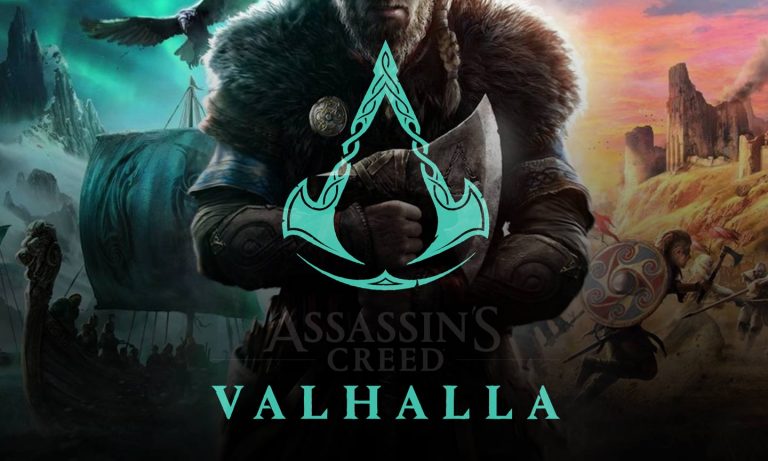 And because of this, the exploration of the world feels more organic: you do it because you want to, and not because you have to. Moreover, England looks simply amazing — in this regard, Ubisoft raises the bar of quality higher and higher with each release. Even on PS4, the beauty and variety of scenery is breathtaking. Fog-covered swamps, flower meadows, green hills, steppes with arable land, melancholic forests covered with yellowness, valleys between mountain slopes… In general, the soul sings, the heart rejoices. nine0003
And because of this, the exploration of the world feels more organic: you do it because you want to, and not because you have to. Moreover, England looks simply amazing — in this regard, Ubisoft raises the bar of quality higher and higher with each release. Even on PS4, the beauty and variety of scenery is breathtaking. Fog-covered swamps, flower meadows, green hills, steppes with arable land, melancholic forests covered with yellowness, valleys between mountain slopes… In general, the soul sings, the heart rejoices. nine0003
Full-fledged side quests have been replaced by world events — sketches a couple of minutes long, telling small stories. There are dramatic ones among them, but such deliberately absurd ones are still more common
There is only one “but”: there are no real incentives to explore this wonderful, heartbreakingly beautiful world. Technically, they are, but after 60 hours of gameplay, it seems to me that the rewards for research are not worth the effort at all.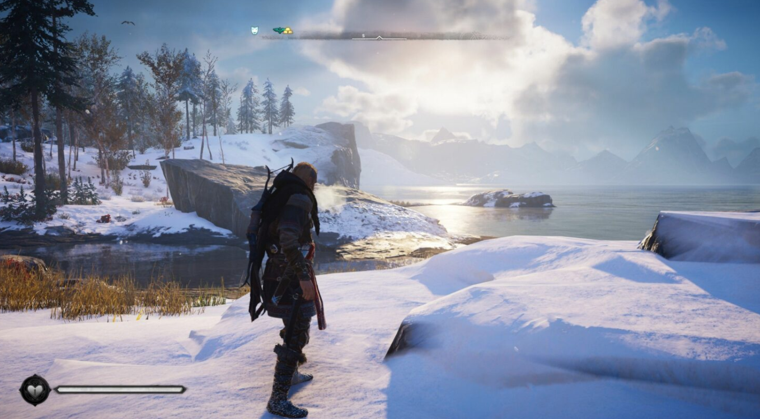 Unless, of course, you suffer from the terminal stage of 100% centophilia. It is possible to collect Roman artifacts (always masks for some reason) in the ruins and deliver them to the collector in Ravensthorpe, but in return you will only receive decorations for the village. You can hunt legendary animals, but you can’t exchange trophies for cool weapons and armor — keep some cosmetic nonsense. I do not argue that really useful things are also hidden in the open world (new weapons and fragments of armor sets), but they are unbearably rare for such a long game. nine0003
Unless, of course, you suffer from the terminal stage of 100% centophilia. It is possible to collect Roman artifacts (always masks for some reason) in the ruins and deliver them to the collector in Ravensthorpe, but in return you will only receive decorations for the village. You can hunt legendary animals, but you can’t exchange trophies for cool weapons and armor — keep some cosmetic nonsense. I do not argue that really useful things are also hidden in the open world (new weapons and fragments of armor sets), but they are unbearably rare for such a long game. nine0003
Assassin’s Creed has been having a hard time with history lately. In Odyssey it was impossible to use a shield, and in Valhalla short swords disappeared somewhere — apparently, the authors decided that two-handed ones are cooler.
This is exactly the extreme that I spoke about earlier. In their quest to eradicate grind and filler content, the authors have devalued almost everything that you can (and, by design, need) to spend time on. So that those who just want to run through the story do not miss anything interesting, and perfectionists can still get excited about collecting collectible garbage. Is this an effective way to deal with grind? Yes. Did he make the game better? I don’t think. Odyssey was already accused of megalomania, and Valhalla turned out to be almost more — but there was even less interesting content. nine0003
So that those who just want to run through the story do not miss anything interesting, and perfectionists can still get excited about collecting collectible garbage. Is this an effective way to deal with grind? Yes. Did he make the game better? I don’t think. Odyssey was already accused of megalomania, and Valhalla turned out to be almost more — but there was even less interesting content. nine0003
You Died
Let’s say that this problem can be avoided if you play Valhalla in portions, without rushing anywhere. It’s quite possible that I burned out due to the tight deadlines: after all, I sat in the game for a week without breaks for food and sleep, and such marathons are contraindicated with sandboxes. However, of all the things that the developers could absolutely do better, the combat system is the most offensive of all. And not because she’s bad, no — she’s just fine. It could just turn out great, but it turned out just “normal”. nine0003
First, the good: the battles in the game are extremely spectacular. Not due to bloody finishing moves with dismemberment, but due to choreography, if you can call it that. When the AI of the enemies does not fall into a stupor, the opponents react extremely vividly to the actions of Eivor. Some throw away their shields and rush head-on, others pick up the weapons of their fallen comrades, others generally flee from the battlefield. Spearmen try to catch you on counterattacks, swordsmen dodge blows, huge «goliaths» try to grab the Viking and smash it on the wall with one throw. In battles, you always need to be on the alert, because the game does not give up — you can die here in a few seconds. nine0003
Not due to bloody finishing moves with dismemberment, but due to choreography, if you can call it that. When the AI of the enemies does not fall into a stupor, the opponents react extremely vividly to the actions of Eivor. Some throw away their shields and rush head-on, others pick up the weapons of their fallen comrades, others generally flee from the battlefield. Spearmen try to catch you on counterattacks, swordsmen dodge blows, huge «goliaths» try to grab the Viking and smash it on the wall with one throw. In battles, you always need to be on the alert, because the game does not give up — you can die here in a few seconds. nine0003
When you really want to kill someone for the glory of Thor
This sense of chaos and danger, coupled with Eivor’s abilities, constantly creates wildly cinematic scenes completely out of the blue. Crush the skull of one enemy, harpoon another and send it straight into the bag of flour to create an impromptu smoke screen. The third at this time throws his heavy two-handed ax at you — but you intercept it in the air and return it to the owner’s head. And the fourth just bring down to the ground and muzzle with your fists until your stamina runs out. The weight of the blows, unfortunately, is felt weakly, but at such moments the fights bring purely aesthetic pleasure. You feel like a born warrior: incredibly skilled, but still vulnerable, unlike Odyssey. nine0003
And the fourth just bring down to the ground and muzzle with your fists until your stamina runs out. The weight of the blows, unfortunately, is felt weakly, but at such moments the fights bring purely aesthetic pleasure. You feel like a born warrior: incredibly skilled, but still vulnerable, unlike Odyssey. nine0003
Now for the bad: Ubisoft Montreal clearly tried to play on the FromSoftware field, but they did it enchantingly ineptly, as if at random. Stamina management, limited heals, equipment weight, different types of attacks from Sekiro , rally mechanics from Bloodborne — the studio pulled together elements familiar from soulslike, but did not figure out how appropriate to introduce them into the gameplay. At best, you just don’t pay attention to them: weight, for example, only affects the speed of stamina recovery, but they forgot about rolling. At worst, they are mercilessly annoying. The game really could not do without a hard limit on healing? Did the developers really want the player to run through the bushes in the middle of a pathos battle in search of healing mushrooms? nine0003
Naturally, Ubisoft couldn’t resist brazen microtransactions. However, here she took pity and allowed to buy premium items for a special currency
However, here she took pity and allowed to buy premium items for a special currency
Emphasis on timings and parries is great, it takes skill, yes. True, usually, requiring a skill from the user, a normal game would instead offer at least adequate hitboxes and more or less constant rules — here they change by themselves. This dude here takes damage from throwing axes, but the next one doesn’t. You seemed to dodge this attack, but you still took damage. Gopher is not visible, but he is. nine0003
Alas, the only truly consistent thing is how often the game crashes. Ubisoft is generally not known for optimization, but this time the team has outdone itself: the quality control in Valhalla is fabulously bad. The PC version without the Day 1 patch was slow even on top configurations (which is why we had to postpone the text), and on PS4 it crashed steadily with an error several times a day. There are so many bugs and technical flaws in the game that they will be fixed for at least another six months. Terrible audio quality, broken quest triggers, crooked NPC pathfinding, choppy animations, clipping, geometry errors — the list goes on. nine0003
Terrible audio quality, broken quest triggers, crooked NPC pathfinding, choppy animations, clipping, geometry errors — the list goes on. nine0003
But the cats here are huge, emaciated and muzzled
Assassin’s Creed Valhalla was not lucky enough to become the final part of the trilogy. Whether she was first or second, many of her mistakes could be attributed to experimenting with the formula or Ubisoft testing the ground for something new. But, alas, the studio, like the Assassin’s Creed series itself, has long exhausted its credibility, and there is nothing to justify the deplorable state of the release version of the game.
Assassin’s Creed Valhalla has a lot of problems — both fixed by patches and fundamental ones that will not go anywhere. Is it worth putting up with them? If you’re a fan of the franchise or have been waiting for a big, expensive Viking game with at least a claim to history, then yes. In any other case… Not sure. nine0003
It’s not that I regret wasted 60 hours of my life, but something tells me that I could have used this time to my advantage. Although the beards of the Vikings, of course, are noble, yes.
Although the beards of the Vikings, of course, are noble, yes.
Pleased
- curious setting;
- the most charismatic protagonist since Ezio;
- spectacular combat system;
- attention to detail;
- soundtrack gives you goosebumps.
Disappointed
- a very long story;
- monotonous story missions;
- meaningless optional content;
- extra soulslike mechanics;
- catastrophic bug situation.
How we played
What: keys provided by the publisher.
On what: PC and PS4.
How much: over 60 hours.
Achievement
«Pain»
The whole game is in vain to look for one-handed swords.
About localization
There is a full translation into Russian, but in order to appreciate the acting work, it is better to play with subtitles. And, if possible, entirely in English: translators ruined the ornate, slightly archaic language of the Danes and Saxons.
Verdict
Assassin’s Creed Valhalla isn’t perfect, to put it mildly — even after fixing Odyssey’s bugs, it still has a lot of problems. Enough to get around the game. But if you love the series, you are interested in the theme of the Vikings, and for this you are ready to close your eyes to everything else, then feel free to add another point to the rating. The main thing is not to expect revelations from the game. nine0003
Overview of Assassins Creed Valhalla. I’m a fool, I cleared everything / Computer and mobile games / iXBT Live
I experienced a very strange feeling after playing such a large-scale game, especially considering the fact that I went through all three last parts with little or no distraction from other projects. No joy, no sadness, nothing, just emptiness. After the passage of the Odyssey, there was anger about the lost time, but here there are no emotions. That’s what it’s like to go through games by inertia, just for the love of the series, which once could.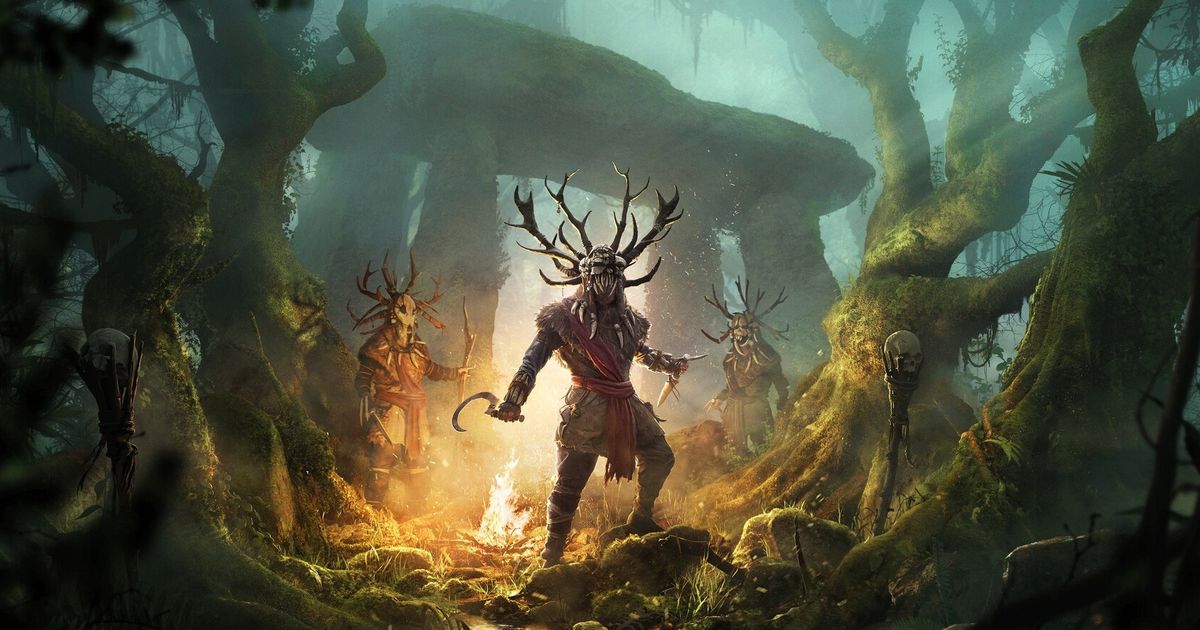 nine0003
nine0003
After the turning point of the series, starting with Origins, I was afraid to play Assassins Creed, the game world became too big and not attractive. With the release of the last part, I gathered my courage and decided it was time to catch up, because there must be something in these games, since there are so many discussions. I liked the origins, it was not intrusive, the order of the ancients consisted of a small circle of people and I knew the ultimate goal of the game, so although not from the first approach, I passed the game.
The Odyssey became a pain, after passing it there was only anger and longing for the time spent. How could the game be so smeared ?, I do not understand. Five times I started and quit playing. Yes, then I got ready and went, 100+ hours for no reason, killed everyone for the sake of a boring ending. Uninteresting tasks, an endless war that only interferes and confuses the player, and an infinite number of members of the order. In short, hell, not a game. nine0003
nine0003
Everything turned out easier with the Vikings, the setting bribed me and I completely passed it from the first approach. More about this.
Narration
Everyone who needs to have passed the game a long time ago, and they know how it all ended, and whoever is going to go through will see everything himself. Yes, I’m a little Captain-obvious. I’ll start with a word of caution, after the prologue, when you leave the animus, Abby will meet you. Just kidding, of course, this is Layla Hasan, the main character of the last parts of the game, which we see when leaving the animus, but what happened to her? She was heavily influenced and turned into this. nine0003
Fortunately, we are going through the main company for a brutal Viking, and I honestly don’t understand who in their right mind chose a female character here. Eivor is a worthy contender for the legends, who follows his brother and Jarl Sigurd throughout the game, and eventually becomes Jarl himself. The whole company for the conquest of England looks very good, and most importantly, the player sees the ultimate goal, to conclude an alliance with all regions. There are no complaints about this part of the story, the quest chains of each settlement are well done and are completed quite quickly. nine0003
There are no complaints about this part of the story, the quest chains of each settlement are well done and are completed quite quickly. nine0003
Unlike the Order of the Ancients, a mysterious organization whose members we must exterminate. Starting with the Odyssey, the “Order of the Ancients” was turned into a bunch of incomprehensible people. Looking back at the past installments of the series, killing members of the order has always been something meaningful, and the methods of killing can be considered an art form in its own right. Even in Origins, these were important people, and there weren’t many of them. In the last two games, the order was turned into a herd, of course the great conspirators must have pawns, but why drag them into the plot. Thus, Ubisoft depersonalizes the order as a mysterious and terrible organization, turning them into a «club of interests.» In case anyone is wondering, Odyssey has 44 terms, not including additions, and Valhalla has 46.
Quests, or rather world events, is another new-found nonsense of this game. Odyssey was scolded for boring tasks, okay, here are the same boring tasks for you, but smaller. Among the mountains of garbage, there are interesting and funny mini-quests, but the rest is garbage. The very name «world event» looks silly when you need to play hide and seek. Plus filed all this, again, very bad. It’s one thing to come to the city and get quests, or you see the quest icon on the map, and then you come to the icon, and then put a picture on the stones or eat mushrooms and pass the test. Defeating the old viking and sending him to Valhalla is a good thing, and this also applies to world events, but it could be displayed with other icons. nine0003
Odyssey was scolded for boring tasks, okay, here are the same boring tasks for you, but smaller. Among the mountains of garbage, there are interesting and funny mini-quests, but the rest is garbage. The very name «world event» looks silly when you need to play hide and seek. Plus filed all this, again, very bad. It’s one thing to come to the city and get quests, or you see the quest icon on the map, and then you come to the icon, and then put a picture on the stones or eat mushrooms and pass the test. Defeating the old viking and sending him to Valhalla is a good thing, and this also applies to world events, but it could be displayed with other icons. nine0003
The ending of the game turned out to be not expressive, after capturing all the areas, you are waiting for a grandiose battle and cutting off the head of the king, but you get a small battle with another pawn. The first thought is that this is probably the beginning of a chain of tasks and something grandiose awaits at the end, they couldn’t do that…. Even as they could, after such an ending, the overall impression of the entire passage was greatly spoiled.
Even as they could, after such an ending, the overall impression of the entire passage was greatly spoiled.
Get involved to your health
It’s no secret that Ubisoft wanted to make their own The Witcher, but if such professionals get down to business, then from any open world, it turns out Far Cry or Assassins Creed. It’s just that you don’t stumble on tasks, so the player stupidly clears the map in search of good mini-stories. In each region there are three types of sweeps, which are further subdivided into several types. Treasures: ability books, rare resources and equipment. Mysteries: mini-quests, killing dangerous animals and vikings, mushroom challenge, drawings on stones, stacking stones and fluting. Artifacts: pages of the saga, treasure maps, destroying totems and collecting ancient masks. If I missed something, sorry. nine0003
Perhaps this will not be enough for the players, the developers thought, and here’s another activity for you, you need to catch a lot of different fish, collect pages of the Assassin’s code, hunt animals and go on raids. I admit, I was a little cunning in the title of the review, because I cleared only the main gathering, treasures, secrets and artifacts, and also killed all the members of the order, given their number, this is also an element of gathering. And all this was in vain, obviously of course, but the point is that when I first arrived at the location, I cleared it of badges so that nothing loomed before my eyes, and then I went through the main missions of the region. And so I pumped the hero, and without that easy battles became wildly boring. nine0003
I admit, I was a little cunning in the title of the review, because I cleared only the main gathering, treasures, secrets and artifacts, and also killed all the members of the order, given their number, this is also an element of gathering. And all this was in vain, obviously of course, but the point is that when I first arrived at the location, I cleared it of badges so that nothing loomed before my eyes, and then I went through the main missions of the region. And so I pumped the hero, and without that easy battles became wildly boring. nine0003
Died only when he ran into strong warriors in events, and that’s because the level is not indicated until you start the battle. Rhetorical question, what are level 340 enemies doing in a level 160 region. Another form of entertainment is raiding for supplies. And we must pay tribute, it was done well, the usual outposts remained, but began to feel differently. They have become a place of profit and within the framework of the setting and look more harmonious and justified. What can not be said about the resources from the raids, because they are needed for the useless pumping of the settlement, which, apart from visual enjoyment, does not give special bonuses. nine0003
What can not be said about the resources from the raids, because they are needed for the useless pumping of the settlement, which, apart from visual enjoyment, does not give special bonuses. nine0003
Speaking of battles, things are bad again. A huge tree of pumping, looking at which you think “wow, how many abilities” yeah, passive. Yes, there are a few skills that add new animations, like sliding or ramming, okay, but what about the rest? Plus armor, +health, +bow crit chance, +stun, etc. All this could fit in one column of increasing various characteristics, and not create the appearance of something grandiose, the tree is beautiful, only the fruits are rotten. There are also skills, only there are few interesting ones, although no, there are also few skills, but there are almost no interesting ones. All the same shield penetrations, poisoned arrows, multi-shot, setting a raven, everything that you highlighted earlier. Close combat is the same theme, the kick, ramming were slightly changed, the most interesting thing is the throwing of axes, which were shown in every trailer. Hack, there is simply no other word, why invent abilities, add interesting mechanics, and so it will do. There is not even a banal counterattack after a parry, in short, shame and disgrace. nine0003
Hack, there is simply no other word, why invent abilities, add interesting mechanics, and so it will do. There is not even a banal counterattack after a parry, in short, shame and disgrace. nine0003
Scolded, now you can praise, after a bunch of useless weapons and armor in the Odyssey, I liked the way the developers approached this issue in this part. Several sets of armor and several types of each weapon, which in the overall picture of battles is no different, only by type. Therefore, you can pump each view to the end and enjoy, sometimes changing them. Another big plus, the game has become more mature, the arms, legs and heads finally fly off, and this is good news after the cardboard opponents in the previous parts of the series. The nuance is only in pumping equipment, a bunch of unnecessary runes that I usually forgot about. nine0003
Small comparison
Walking through Valhalla, I was reminded of another game with «involvement» elements, Shadow of Mordor. In fact, these two games are very similar, in both the main character uses a bow and melee weapons, can go through outposts using stealth or an open attack.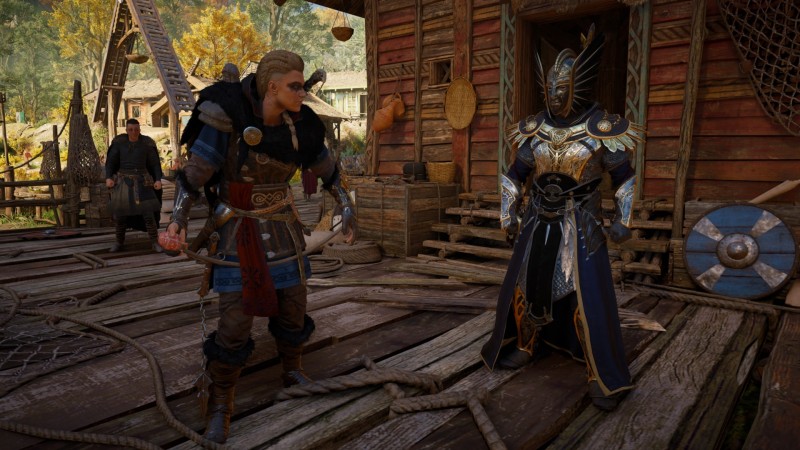 And here and there there is the capture of fortresses. Only in one, everything except the involvement is done perfectly, and in the other, “fuck off.” In Mordor, the combat mechanics are also not very rich, but they can please with different tricks and spectacular battles. The dynamics of battles is made much more cheerful, and most importantly, you die from enemies, unlike Valhalla. The capture of the castle in assassin is certainly more woven into the plot, but it is done very badly. Standing in burning oil, I alone destroyed the gates with the help of a battering ram, the scale of the battle was not felt at all, and there was no point in beating enemies, just break the gates and lower the bridge and you will be happy. In Mordor, when capturing a castle or defending, you can easily be defeated, you need to kill officers, help your own, fight off monsters, and in the end defeat the captain, who may have already fought with you and knows your tricks. nine0003
And here and there there is the capture of fortresses. Only in one, everything except the involvement is done perfectly, and in the other, “fuck off.” In Mordor, the combat mechanics are also not very rich, but they can please with different tricks and spectacular battles. The dynamics of battles is made much more cheerful, and most importantly, you die from enemies, unlike Valhalla. The capture of the castle in assassin is certainly more woven into the plot, but it is done very badly. Standing in burning oil, I alone destroyed the gates with the help of a battering ram, the scale of the battle was not felt at all, and there was no point in beating enemies, just break the gates and lower the bridge and you will be happy. In Mordor, when capturing a castle or defending, you can easily be defeated, you need to kill officers, help your own, fight off monsters, and in the end defeat the captain, who may have already fought with you and knows your tricks. nine0003
It may sound absurd, but Ubisost, buy the rights to add the Nemesis mechanic to their series. And to implement it in your own way, so that when fighting in the next castle or outpost, you stumble upon a member of the order of the ancients who was sent for your head. For example, from the observations of intelligence of the order, he knows your tricks. Of course, this is just an idea, but something new needs to be invented, as judging by the latest Far Cry, people are starting to understand a little. Although, given the speed of understanding, Ubisost may copy itself for several more years before people realize that they are playing the game «find 10 differences from the previous part.» nine0003
And to implement it in your own way, so that when fighting in the next castle or outpost, you stumble upon a member of the order of the ancients who was sent for your head. For example, from the observations of intelligence of the order, he knows your tricks. Of course, this is just an idea, but something new needs to be invented, as judging by the latest Far Cry, people are starting to understand a little. Although, given the speed of understanding, Ubisost may copy itself for several more years before people realize that they are playing the game «find 10 differences from the previous part.» nine0003
Results
Taking into account all the nonsense mixed with the truth that I wrote, Valhalla turned out better than Odyssey, but slightly worse than Origins. It’s still a huge and boring world that only needs to be played through the story. When making their games, Ubisoft copies other people’s ideas every time, but where it was necessary to write off completely, it decides to make its own vision, and where it does not need to be touched at all, it writes off completely (this is mainly from themselves).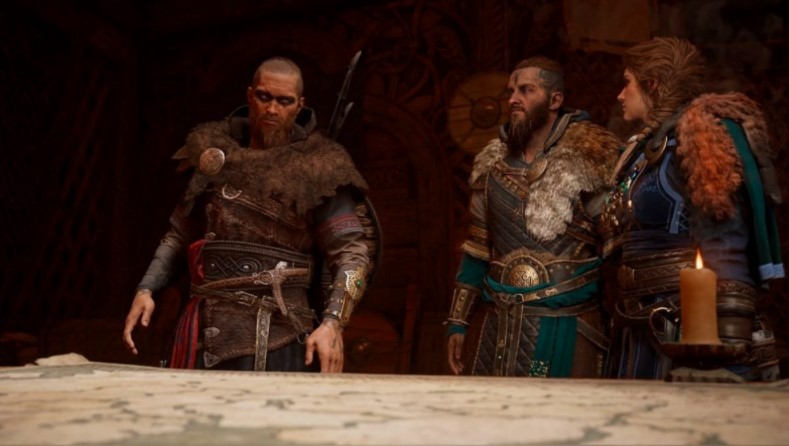 The battles look good, but there are few abilities and skills, the plot is interesting, but predictable, when you come to the region you immediately understand who is a traitor and who is good. There are many activities, but most are stupid and break the balance. nine0003
The battles look good, but there are few abilities and skills, the plot is interesting, but predictable, when you come to the region you immediately understand who is a traitor and who is good. There are many activities, but most are stupid and break the balance. nine0003
Many do not understand why the «grandfathers» shout that it used to be better, but I do not understand how it was possible to come to this. The combat part was simpler in previous games, but it was more dynamic and harmonious, and there were more cool moments with kills of key persons. Penetrate into an inaccessible place and kill your target there, and then escape from persecution, and not destroy everything in a row like a terminator. There was in it all, some kind of charm. Again, the plot was clearer, both in the animus and in reality. And you didn’t have to study everything thoroughly to understand it. Returning to the previously mentioned Witcher 3, Valhalla still managed to come close to this game in terms of atmosphere and beauty of landscapes.
